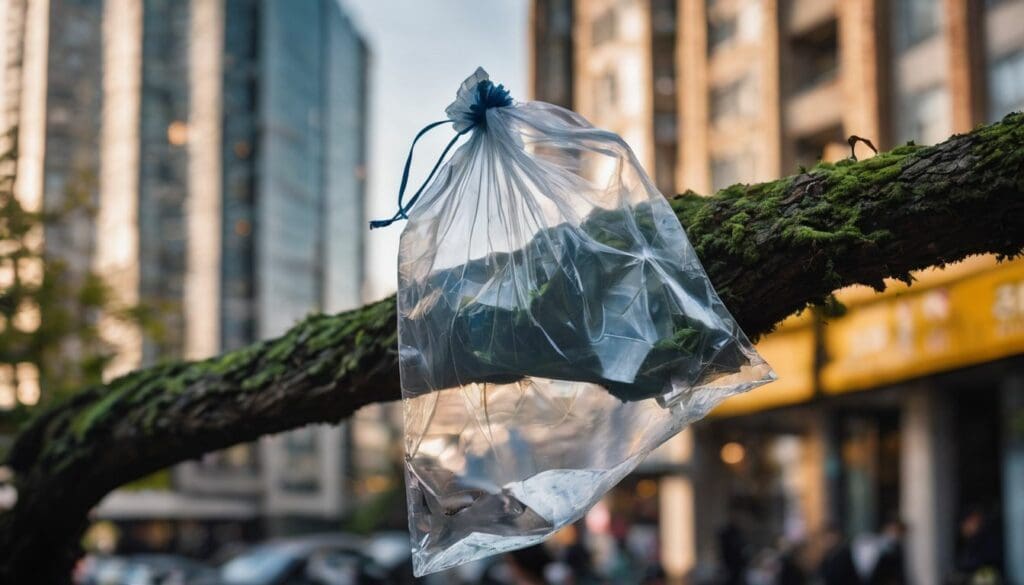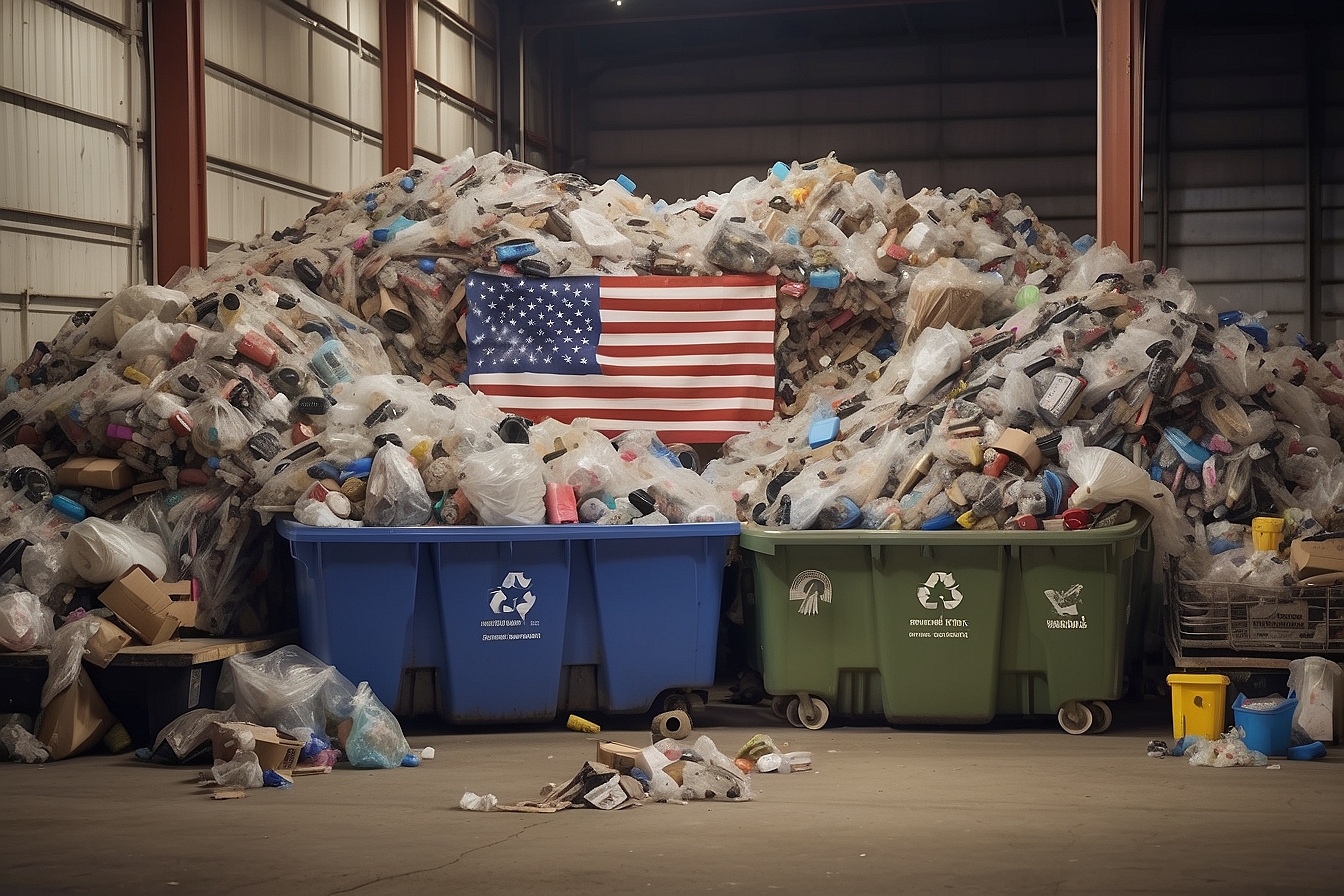We’ve all noticed them, haven’t we? Plastic bags lingering in our beautiful trees and meandering down our local high streets – they’re practically part of the urban landscape. Like you, these sights tinge our hearts with a shade of sadness; indeed, it’s staggering to think that up to 5 trillion single-use plastic bags are consumed globally each year.
We’ve taken a deep dive into research to unearth practical actions and pioneering innovations that can confront this issue squarely. Immerse yourself in solutions as we explore together – for it’s time we waved goodbye to the unsightly spread of plastic bags once and for all.
Key Takeaways
- Up to 1 trillion single – use plastic bags are used globally every year, causing serious environmental issues including wildlife harm and marine pollution.
- Effective solutions include government bans or taxes on plastic bags, encouraging businesses to switch to sustainable packaging, and innovation in recycling technologies.
- Individual efforts can make a big difference; using reusable shopping bags and participating in clean-up events help tackle the problem of plastic bag pollution.
- Plastic waste management innovations are essential for transforming the lifecycle of plastics, with advances such as biodegradable plastics and improved recycling processes leading the way.
- Combining government action, individual responsibility, and innovative technology is vital for reducing the negative impact of single-use plastics on our environment.
Plastic Bag Pollution: A Global Issue
Plastic bag pollution is a serious global issue, with an estimated 500 billion to 1 trillion single-use plastic bags used worldwide every year. The negative effects of plastic bag pollution are evident in the environment, landfills, and oceans.
Facts about single-use plastic bags
We see single-use plastic bags everywhere, from supermarkets to street markets. They’ve become a symbol of convenience, but their environmental impact is far-reaching and severe.
- Every year, we use approximately 1 trillion single – use plastic bags globally. This staggering figure highlights our heavy reliance on these items for everyday tasks.
- Despite their widespread use, only a tiny fraction of these bags are recycled. Most end up in landfills or, worse, scattered throughout the environment, where they persist for centuries.
- Wildlife suffers greatly as animals often mistake plastic bags for food. This leads to injury and death for a multitude of species both on land and in our oceans.
- Single – use plastics contribute significantly to marine pollution. It’s estimated that there are now 15 to 51 trillion pieces of plastic in the world’s oceans.
- In urban areas, discarded plastic bags can clog drainage systems. This results in increased flooding and provides breeding grounds for disease-carrying pests like mosquitoes.
- The production process of single – use plastic bags uses vast amounts of fossil fuels. In turn, this releases significant greenhouse gases which contribute to climate change.
Negative environmental effects
Plastic bag pollution has detrimental effects on the environment, posing a severe threat to wildlife and ecosystems. As plastic bags break down, they release toxic chemicals into the soil and water, impacting plant life and contaminating water sources.
Additionally, plastic bags pose a significant danger to marine life when mistaken for food or becoming entangled in them. The presence of plastic waste in oceans also disrupts marine habitats and contributes to the decline of sensitive species such as sea turtles and seabirds.
Furthermore, plastic bag pollution exacerbates environmental degradation by clogging drainage systems, leading to flooding during heavy rainfall. This results in an increased risk of disease transmission due to stagnant water accumulation.
Impact on landfills and ocean
Plastic bags have a significant impact on landfills and oceans. When discarded, they end up in landfills, where they take hundreds of years to decompose. This clogs up landfill space and increases the need for more landfills, further encroaching upon natural habitats.
In addition, plastic bags that are improperly disposed of can make their way into the ocean, causing harm to marine life. The bags break down into smaller pieces over time but never truly biodegrade, posing a threat to wildlife that mistake them for food.
The presence of single-use plastic in our environment is alarming. It affects not only the cleanliness of our surroundings but also the health and safety of both terrestrial and aquatic ecosystems.
By changing our habits and encouraging innovative waste management solutions, we can reduce this pervasive pollution.
Solutions to Reduce Plastic Bag Pollution
To reduce plastic bag pollution, government action and regulations on single-use plastics are crucial. Individuals can also contribute by adopting eco-friendly habits and using reusable bags.
Innovation in plastic waste management is also essential for a sustainable solution.
Government action and regulations
To address plastic bag pollution, the government can take specific actions and implement regulations to enforce change.
- Enforce bans or taxes on single-use plastic bags to discourage their use and promote eco-friendly alternatives.
- Implement strict regulations on plastic production, usage, and disposal to reduce environmental impact and control pollution.
- Introduce policies that encourage businesses to adopt sustainable packaging practises and offer incentives for using biodegradable materials.
- Invest in public awareness campaigns to educate citizens about the harmful effects of plastic pollution and the importance of reducing single-use plastics.
- Support research and development for innovative solutions in plastic waste management and recycling technologies to create a more sustainable system.
- Collaborate with international organisations to develop global initiatives and agreements aimed at tackling plastic pollution on a larger scale.
- Create partnerships with local communities, non – profit organisations, and industry stakeholders to implement comprehensive strategies for addressing plastic bag pollution.
Individual actions and habits
To reduce plastic bag pollution and support environmental conservation, we can take the following individual actions and habits:
- Use reusable bags when shopping to reduce the demand for single-use plastic bags.
- Say no to plastic bags at checkout counters and opt for eco-friendly alternatives such as paper or cloth bags.
- Participate in community clean – up events to remove plastic debris from local environments.
- Educate others about the impact of plastic pollution on wildlife and marine ecosystems.
- Support businesses that promote sustainable practices and offer biodegradable packaging options.
- Properly dispose of any plastic waste by recycling it whenever possible.
Innovation in plastic waste management
In exploring ways to address plastic pollution, innovating in plastic waste management is crucial. By developing new technologies and processes for recycling and repurposing plastics, we can reduce the amount of plastic that ends up in landfills and oceans.
These innovations include advancements in sorting technology, chemical recycling methods, and the creation of biodegradable plastics. Furthermore, initiatives such as using recycled plastics in 3D printing or construction materials demonstrate innovative alternatives that contribute to reducing environmental impact while promoting sustainability.
Eco-friendly practices also benefit from these innovations by providing a wider range of options for more sustainable living. Lastly, continuous research into more efficient and effective waste management solutions will aid in significantly reducing the damaging effects of plastic pollution on our environment.
Conclusion
Taking action to reduce plastic bag pollution is crucial for protecting our environment. Government regulations, individual efforts, and innovative waste management solutions are key to addressing this global issue.
Embracing eco-friendly alternatives and supporting pollution control measures will play a significant role in creating a sustainable future. Together, we can work towards minimising the impact of single-use plastics on our planet.
FAQs
1. What is the challenge of plastic bag pollution?
The challenge involves dealing with environmental pollution caused by single-use plastics, including plastic bags that often end up in oceans and harm wildlife.
2. Why are plastic bags a problem for the environment?
Plastic bags contribute to ocean plastic pollution; they do not break down easily and can impact wildlife as well as overall environmental sustainability.
3. How does plastic bag pollution affect wildlife?
Wildlife suffers from plastic pollution when animals mistake plastic bags for food or get entangled in them, leading to injury or death.
4. Are there any solutions to control plastic bag pollution?
Solutions include implementing a plastic bag ban, promoting eco-friendly alternatives like reusable bags, and enhancing recycling challenges to decrease single-use plastics.
5. Can we really recycle all types of plastic bags?
No, not all types of single-use plastics can be recycled due to technical constraints in recycling facilities; hence reducing use is key for effective pollution control.





